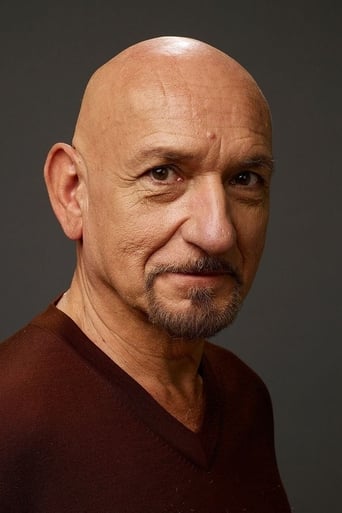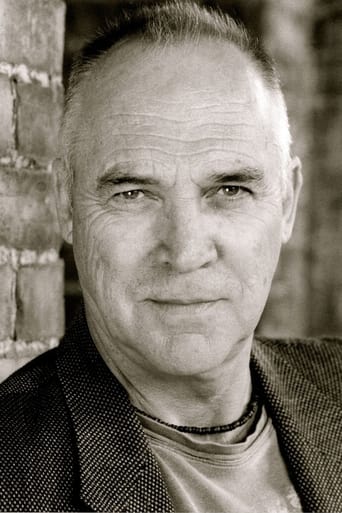CrawlerChunky
In truth, there is barely enough story here to make a film.
Chirphymium
It's entirely possible that sending the audience out feeling lousy was intentional
Adeel Hail
Unshakable, witty and deeply felt, the film will be paying emotional dividends for a long, long time.
Steffi_P
When Ariel Dorfman's play Death and the Maiden, about a victim of rape and torture in a post-fascist regime coming face-to-face with one of her tormentors, was adapted for the screen, it is perhaps no surprise that the project was snapped up by director Roman Polanski. This is story which is both startlingly sensitive and understanding towards victims of rape, and yet one which also reserves a crumb of sympathy for the perpetrator. Two decades after his own conviction for sex crimes, Polanski's decision to make this movie poses the question. Is this the director's apology, or his attempt at self-absolution?Death and the Maiden is, in the first place, a powerful and thoughtful work, on the one hand an exploration of the nature of justice, of justice that satisfies the law and justice that satisfies the individual. And on the other, it is a look at the differences between male and female approaches to love, sex and control. It is in this latter it is at its boldest and most eloquent, even if it does equivocate. There are numerous points in the dialogue which are deeply poignant simply due to the aching truth of them. The power Dorfman's words are carried through to the screen intact.This is in no small part thanks to a flawless cast. Sigourney Weaver gives an understated yet resonant performance that gives every impression that she has really lived what her character has gone through. In her flashes of anger she brings a touch of masculinity to the part, and there is perhaps something of her trying to take on the doctor's identity in the role. Ben Kingsley is of that new breed of chameleonic actors who are able to transform themselves completely for a range of roles. Here he presents numerous facets of his character – friendliness, erudition, vulnerability, spite, and an eventual coldness, all with realistic fluidity. Stuart Wilson gives a worthy if rather bland performance, which is exactly what's needed, as being the least important of the cast he must not overshadow the other two.While Polanski's own offences should not be considered lightly, I have always tried to judge his work (which I often enjoy) separately to his deeds. He does a fair job here, using some intense long takes for key scenes, and creating various different spaces to help us forget how limited the setting is. The pacing is marvellous, and despite being a talky stage adaptation the movie simply races along. And yet, in the context of Polanski's involvement, its final scenes have a slightly sickening, almost pathetic edge.Finally however, my interpretation of the ending is not that Paulina chose to forgive the doctor, but that what she needed for closure was to hear his explanation.
sol
**SPOILERS** Mind bending political as well as psychological thriller involving a former woman freedom fighter Paulina Lorca, Sigourney Weaver,who was brutally tortured and raped by her secret police captors. This all happened back in the spring of 1977 in the secret police trying to get Paulina to reveal the whereabouts and identity of her lover and later husband Gereldo Escobar, Stuart Wilson, who was one of the top leaders of the freedom fighting movement in the country.It's now 17 years later-1994-and with a new democratically elected government in charge Geraldo has been picked by the country's new president to head the newly formed "Commission". "The Commission" has the power in both arresting and prosecuting those who were responsible for the torture and murder of thousands of citizens, like Paulina, whom the previous Fascist Dictatorship felt was a threat to it!As things turn out Gerlado's car gets stuck in the mud on his way home, after being but in charge of "The Commission", where he's then helped by good Samaritan neighbor the kindly Dr. Roberto Miranda, Ben Kingsley, by giving him a ride to his sea-front house. It's when Pauline, who's hiding in the bedroom, who for some reason thinks she's still on the lamb, from the former governments secret police, hears Roberto talk she flips out feeling that he's the person who brutally tortured and raped her some 17 years ago!It's then the the movie, like Paulina, starts to zig-zag merrily along in a number of really off-the-wall sequences. Roberto soon becomes a captive who, like what Paulina accused him of doing to her, ends up being tortured and humiliated by Pauline in order to get a confession out of him! The forced confession, with Paulina holding a gun to his head, has to do in Roberto's involvement with the previous Fascist Government in his supervising the torture of dozens of political prisoners. The government put Paulin's husband Geraldo in charge, by being the head of "The Commission", to see to it that those involve in the torture and murder of thousands of "enemes of the state" are brought before the bar of justice and made to pay for their crimes against the people!Paulina is sure that Roberto is the man who brutally abused her back in 1977 and tries to get him to confess, on video tape, his crimes. Even though when she was supposedly tortured and raped by him Paulina never once saw Roberto's face but only heard his voice and smelled his very bad, due to his heavy consumption of garlic, breath that was far worse then any of the torture he inflicted on her. Gerlado, in him being a lawyer, feels that the evidence Paulina has on Roberto isn't enough for an indictment much less a conviction!The films goes on and on with the poor Roberto being beaten and humiliated by Paulina with her passive husband Geraldo, when he later becomes convinced that Roberto is in fact the "Man", later joining in on the torture sessions. It's when Roberto breaks free and tries to make a run for it that, what seems like, the truth finally comes out! That's only after Roberto is again captured by Paulina & Geraldo and finally, without that much persuasion by the two, seems to come clean with his past!***SPOILER ALERT***The movie ends like it began with Paulina and Geraldo at the theater attending a performance of Schubert's " Death of a Maiden". What we didn't see at first we see later on, when the movie is almost over, in that not only Pauline and Geraldo are in the audience but Roberto, who was supposed to have killed himself by jumping off a cliff, was there as well!
Robert J. Maxwell
Considering that this is a play and rather looks like one, it's pretty good. Well, it's good anyway.A lawyer, Gerardo (Stuart Wilson) and his wife Paulina (Sigourney Weaver) have just retired in their comfortable, isolated house next to a cliff overhanging the sea. The location is somewhere in South America, in a country that has just emerged from despotism and become a democracy. A car has trouble on the road in front of their house. Dr. Miranda (Ben Kingsley) rouses them and asks for help, but an electrical storm has knocked out both the power and the phone.Gerardo and Dr. Miranda are chatting in the living room while Paulina is still in bed. Hearing Miranda's voice, she sits up in alarm, sneaks outside, burns off in Miranda's car and pushes it over a cliff.That, I guess, is the end of Act I. Most of the time we spend with Gerardo and Miranda in the living room. The two men are at loose ends and drink themselves into a cheerfully befuddled state. I can't remember many drunk scenes better than this one. Kingsley, in particular, is given marvelous lines and delivers them as if they were gifts to the audience -- cynical, ironic, high brow, amiable. "I would like to quote Nietzsche in a situation like this," says Kingsley. "At least I think it was Nietzsche. Maybe it was Freud." Gerardo, "If you can remember a quotation, it's usually Freud." The dialog is delicious and matter of fact. The two men are sitting on the porch steps, still thinking Paulina is asleep, musing about where a thief might have driven Miranda's car, and why. "I'm an idiot," says Kingsley. "I'm running down the road yelling 'That's my car!' Of course the thief knows that. That's the whole POINT." Later, when they find out that Paulina has stolen the car, "I mean, what is this -- a regular thing or what? How long do you think we might have to wait? A day or two? A month?" Then the humor dwindles to a palpitating point and vanishes, and the movie becomes echt-serious. Paulina claims that Miranda worked as an interrogator for the now-deposed dictatorship and that he beat, tortured, and raped the women who were his prisoners -- Paulina included. (She's explicit about the techniques.) Gerardo thinks she's crazy. Miranda is astonished and scared to death.Paulina has Miranda tied up and puts him on trial, appointing Gerardo his defense counsel. Some "trial"! If Miranda confesses and shows genuine contrition she'll let him go, otherwise she'll shoot him through the head. Miranda, sensibly, is perfectly willing to confess and get out of this mad house but, since he claims to have had nothing to do with the previous regime, he doesn't know what to confess to. Paulina wants details -- what was she tied up with, ropes or wires? -- that Miranda says he is unable to provide.It's a harrowing movie, with occasional arcs of electricity jumping through it. I'm not certain the ending is played exactly as it would be in real life, but it hardly matters because the acting on the part of all three principals is unimpeachable.I don't want to give away the climax but I'll sum up my impression by saying that it's quite possible to be guilty OR innocent, while still being mad.See it if you can. It's a hard film to forget.
jzappa
Death and the Maiden is one of those darkly comfortable films where the opening moments are so intriguing and spot-on perfect that almost any continuation would be a disappointment. But, alas, movies have to be about something, and so slowly the purity of the situation settles as carefully as it can into the decisively paced story.Sigourney Weaver plays an intuitive and imperious specimen, a troubled housewife, playing her as a woman performing rather than personifying her traditionally feminine position. She is married to a renowned lawyer in an unclarified South American country. One night, a storm forces her husband, played by Stuart Wilson, to ride home with a kind stranger, played by Ben Kingsley. That is the exposition for this absorbing film, directed by Roman Polanski, a natural player in the realm of this story, based on a play by Chilean exile Ariel Dorfman, and clearly so. In the movie's lingering dark of the heart, Kingsley, crudely tied to a chair, will claim his innocence. Weaver will taunt him and interrogate him. And Wilson, her husband, will shudder first in one direction and then in the other, because this doctor is a pleasant and harmlessly polite man and a very intelligent one, and if there is a way for him to talk his way to freedom, he will realize it.This atmospheric drama is, somewhat, on the subject of real shame: Is this the man who raped and tortured her? To some extent, it concerns the character of guilt and its function in one's identity: If this is the same guy, maybe he has changed. Was he a product of the times or a victim of them? If he is guilty, does he atone? Is his crime forgivable to the human standard? Is the woman's husband somehow hindered by a male bonding with this man allegedly hostile to women? All of these reservations lie in wait provocatively beneath the brooding facade of this masterpiece, enriching and intensifying its insatiably vindictive story, which oddly enough is not so much about whether or not this is the man who tortured her, but about the unpredictability of Weaver's behavior, if she really knows what she's doing, if she has an idea of what she will do if she is right and he is in fact her scarring tormentor.The whole story leads up to a moving, unforgettable three-minute monologue by the doctor, giftedly delivered by Kingsley, so that we have to resolve not only the issue of his guilt or innocence in this makeshift trial, but the issue of its value. It is at this stirring climax that one can truly say that this minor string quartet-based masterpiece of claustrophobia is all as regards acting. Kingsley here can compare to the best of the rest of his work with his shrewd performance: He makes his character so smart that whether he's guilty or not, we have a definite appreciation for his struggle, and thus he not only fleshes out the character in Dorfman's drama but also heightens the drama without compromising anything about the script. Another actor, even one just as gifted, may easily have lacked the creative initiative to compel the character as such, a pivotal one at the core of the story.Moreover, without the Sigourney Weaver performance, the film could easily have been a lot less impactful. There must have been the pull to emphasize the years-pent rage of her character, but she not only brings so many other colors to this apparent maven, but understands that in a character who is seeking revenge, less is more, because less can be a whole lot more fulfilling in its jeering and mischief. Characterization is a side-effect that emanates from action and dialogue, and there are times, during the dialogue, when the film certainly clues us into its stage origins, when we feel we have almost been carried back to the tangible events she recalls. And Polanski uses the camera in these time-transcendent moments as a spectator, standing facing her and listening, just as one may want to even when seeing this performed on stage.The conflicted lawyer is credibly by Wilson as a man who would sincerely love to discern the truth, he is a deputy for the audience, the character whose feelings we share when he listens to Weaver's horror stories through Polanski's camera's eyes. But she and Kingsley both know that no jury can satisfy, or grasp, the personality of the circumstances. No more than the torturer and the tortured have shared that information, and perhaps only by changing places can they understand it, and that is what justifies her actions to anyone in the audience, even those who starkly oppose the concept of revenge.






